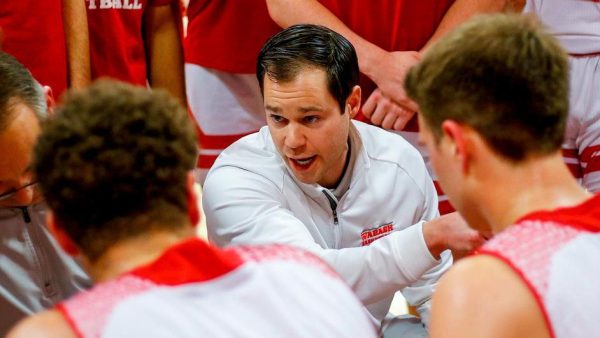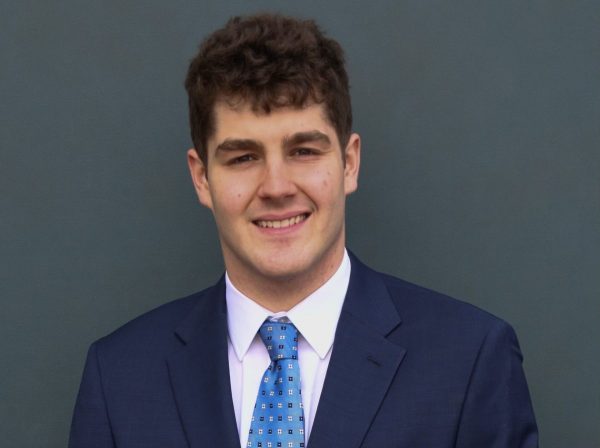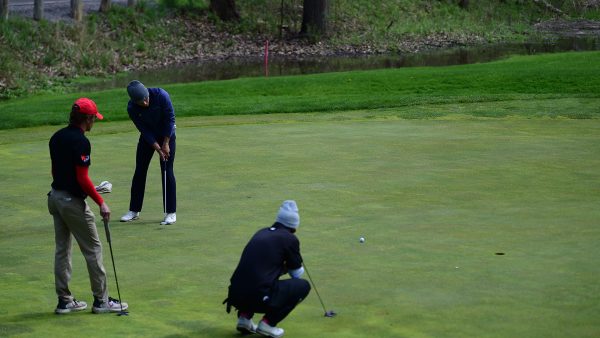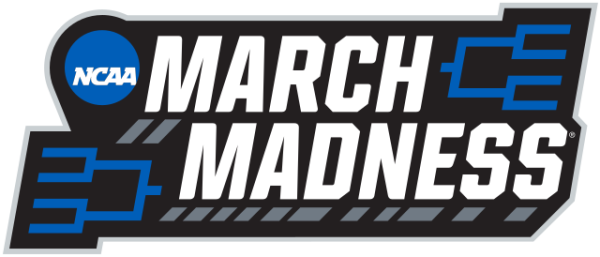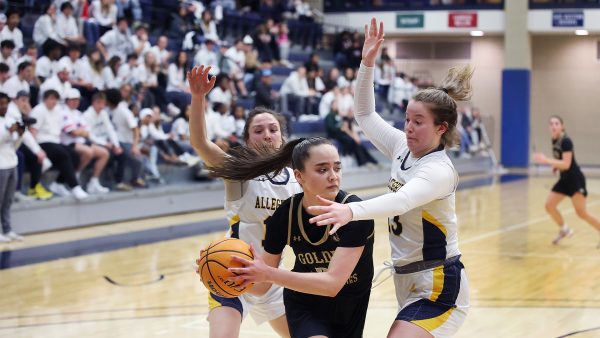Mens basketball’s head coaching position endowed
Photo courtesy of Allegheny College
Allegheny Trustee John Sutphen, ’78, with President Hilary Link in an April 2022 photo provided by the college.
With a $1 million gift, Allegheny Trustee John Sutphen, ’78, and Jaime Sutphen, ’79, have endowed the head coaching position for Allegheny’s men’s basketball team.
The donation, announced via press release last month, was made in honor of former hoops coaches Phil Ness and John Reynders, ’75, who both took teams to the Men’s NCAA Tournament during their tenures.
The new endowment joins the more than 600 other funds that comprise the college’s total endowment of roughly $260 million.
“Our hope is that the James H. Mullen, Jr. Arena becomes a place to reinvigorate students — a place where they can enjoy the fun of winning on cold, dark winter evenings,” Sutphen said in the Aug. 16 press release. “We also hope this investment in the student experience will help Allegheny become more distinctive as a college of choice in higher education.”
Vice President for Institutional Advancement Matt Stinson said that the investment will bring prestige to the Men’s Basketball squad, while freeing up funds from the team’s operating expenses to be used in other areas by the college.
“$1 million dollars is a significant and meaningful investment, and we’re grateful for that,” Stinson said.
A college’s endowment consists of the institution’s investments, and the Board of Trustees determines how much the college will receive from the endowment to go to operating expenses.
According to Stinson, Allegheny aims to spend around 4.25% of its endowment every year, meaning that the Sutphens’ $1 million gift will translate to around $42,500 towards the head coaching position every year.
“It’s offsetting costs that were already being spent in the basketball program,” Stinson said. “It’s not like (head) coach (Bob) Simmons got a raise as a result of this.”
However, Stinson explained the offset costs may not be immediately visible in the way the college operates.
“You won’t see ‘here’s $40,000 in a project over here,’” Stinson said. “What you will start to see is some budgetary relief which allows (Chief Financial Officer and Vice President of Finance and Administration Linda Wetsell) to escalate the time frame on some of the other things, like bathrooms in dorms … the more funds that we can free up, the more we can reinvest in the campus.”
Stinson also said that a new endowment for an athletics program does not mean that money is being taken away from other extracurricular programs at the college.
“I’ll use the choir as an example,” Stinson said. “The choir has a fund that they have at their disposal as well. So it’s not athletics over the arts, it’s athletics and the arts. We’re not picking one or the other.”
Allegheny’s athletic programs already have two endowments, Stinson said. Funding from one focuses on maintaining the Frank B. Fuhrer Field and Robertson Athletic Complex, while the other offsets costs from a tournament for both Men’s and Women’s Basketball. Other schools within the Presidents’ Athletic Conference — which Allegheny joined in July of this year — have also established endowments for athletic purposes.
In early August of this year, Carnegie Mellon University in Pittsburgh received an anonymous $1.25 million donation in honor of former CMU football head coach Rich Lackner. The gift established an endowment supporting diversity, equity and inclusion efforts within the school’s athletics.
The position of Athletic Director at Case Western Reserve University in Cleveland is named after CWRU alumnus James Wyant, whose October 2020 gift of $2 million established an endowment fund supporting the Ohio school’s athletics.
At Allegheny, athletic endowments are far outnumbered by funds devoted to academic programs. Stinson said that the college offers around 360 endowed scholarships, and around 140 endowments for a variety of programs from student-faculty research to Gator Success Grants — a program offering supplemental financial assistance of up to $1,000 for students.
“We’re getting a lot of support right now for Gator Success Grants as alumni learn more about them,” Stinson said. “We have 22 endowed professorships and I imagine that in our next (fundraising) campaign, we’ll get even more.”
Stinson also said that while the Sutphens’ gift towards the head coaching position was announced and celebrated, other, more private gifts provide key funding to other forms of student support.
“I just had a lovely lunch on Friday with a family that was creating an endowed fund to go towards Gator Success Grants in honor of their father’s 80th birthday,” Stinson said. “My team does that sort of stuff on a daily basis. So we’re always doing this. It doesn’t always get the publicity of the million dollar endowed fund, but collectively, they’re all just as important.”

Sami Mirza is a senior from many different places. He is majoring in International Studies with a focus on the Middle East and North Africa and minor in...




